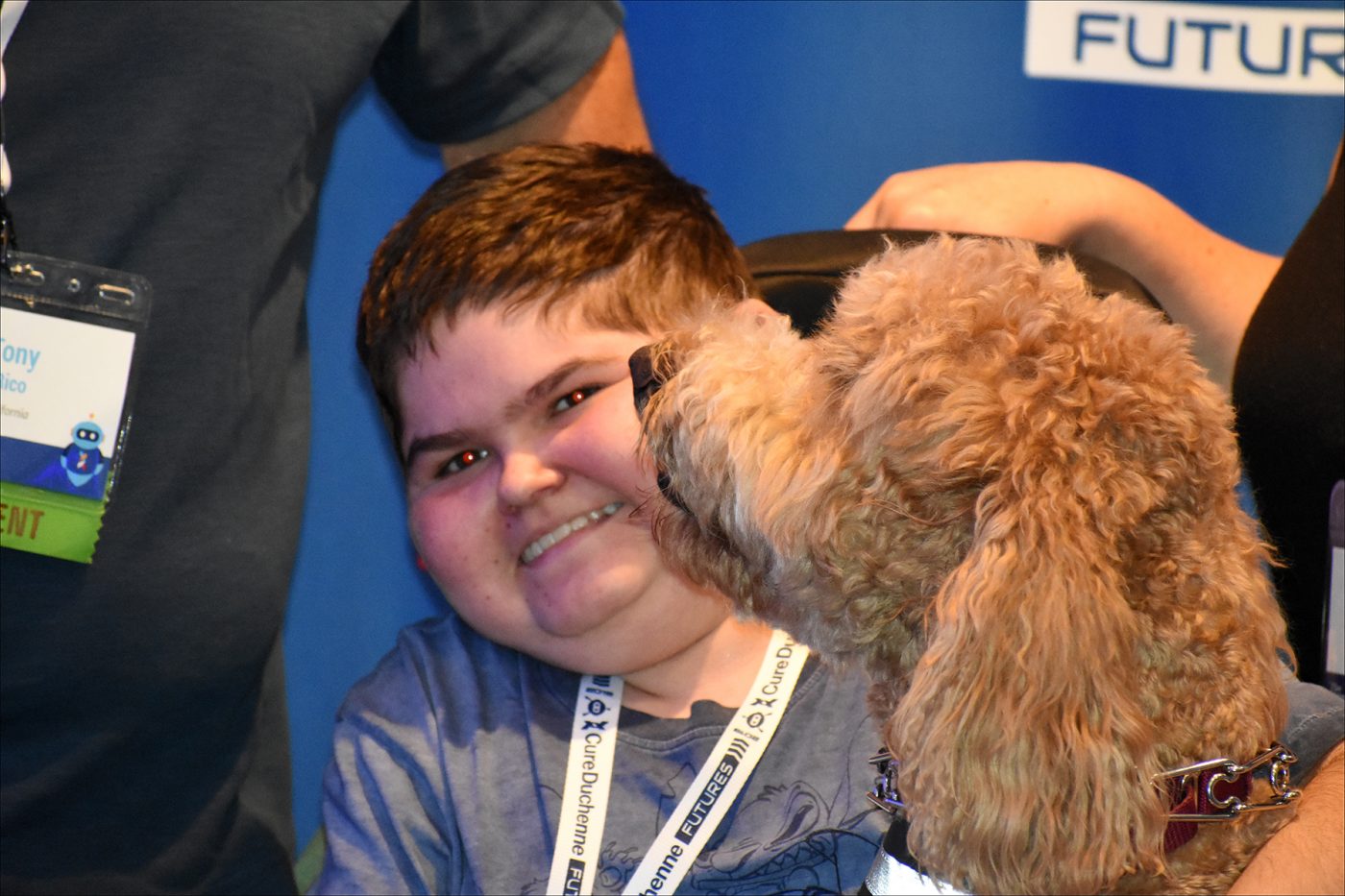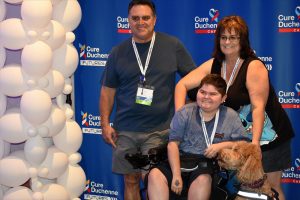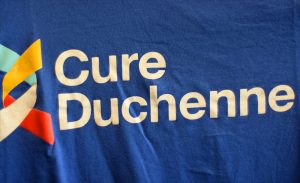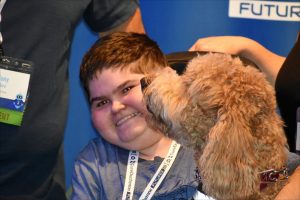Duchenne MD Patient Tanner Rico Approaches Life With Optimism

Tanner Rico, who has DMD, enjoys the company of his dog, Sasha, at the CureDuchenne Futures conference in Anaheim, California.
Traci and Tony Rico of Cardiff-by-the-Sea, California, juggle more than their share of family health issues.
Their son, Tanner, has Duchenne muscular dystrophy, and their daughter, Pria, has recurrent respiratory papillomatosis (RPP) — a rare genetic condition that has led to 97 surgeries to remove tumors in her larynx and vocal cords, and has left her nearly voiceless.
The siblings were diagnosed with their respective rare diseases 13 years ago, within two weeks of each other.
“We are two people that should never have procreated,” Traci joked during an interview in suburban Los Angeles, as her husband sat nearby, laughing.
Tanner, who was diagnosed with Duchenne at age 2, is now 15. He and his parents spoke with Muscular Dystrophy News Today at the 2019 Futures conference, organized by the nonprofit group CureDuchenne.
“When he was first diagnosed, like with anybody, it was a big slap in the face,” she recalled. “My sister was getting her medical degree at the time, and she told us to be actively involved. So I started researching, looking for different organizations.”
Difficulties in kindergarten
Rico said her daughter’s grade-school class raised enough funds to finance a trip to Cincinnati Children’s Medical Center, so Tanner could see Duchenne specialist Brenda Wong, MD.
“We went back a year later, and she remembered him even though she sees so many kids,” Rico said of Wong, who now runs a specialized Duchenne program at UMass Memorial Medical Center west of Boston.
“He’s the happiest kid, even though he’s not walking anymore,” Rico said. “He walks only with my husband supporting him. He loves people, he has dreams and ambitions. He wants to be a motivational speaker and encourage other people.”
After Tanner’s diagnosis, the couple decided that Tony, who ran a family nursery, would be a stay-at-home dad.
“I was an accountant for 20 years, and then got laid off from my job. I decided to go back to school and get a degree in special education,” she said. “We make every sacrifice we can to give Tanner the best quality of life, but after my son started kindergarten, we had some struggles with the school system and them understanding what Duchenne is about. In kindergarten, on the second day of class, he got sent to the principal’s office because he threw a tantrum.”
Apparently, Tanner had wanted to use the playground like everyone else, “and in their ignorance, they let him stand on line to get on the swings, but then escorted him back to the end of the line,” his mom said. “They thought they were giving him social skills, but he caught on quickly.”
23 pills and a power wheelchair
Tanner takes 23 pills every day. His regimen includes aspirin (he had a stroke two-and-a-half years ago), omega-3 fish oil, Prozac (fluoxetine) to fight depression, and Emflaza (deflazacort), a steroid marketed by PTC Therapeutics.
“I take all my pills in a certain order,” the boy said proudly, adding, “yeah, it’s my OCD.”
Rico said her son also receives a one-hour infusion of Exondys 51 (eteplirsen, by Sarepta Therapeutics) every Tuesday from a nurse who comes to their house.
“Before he started on steroids, he was so tiny. You would never have recognized him,” Rico said of Tanner, who now weighs 124 pounds.
Before having that August 2017 stroke — on his first day of school, no less — Tanner could walk around the house. Now he depends on a QM-710 power wheelchair. The family’s insurance covered two-thirds of the $30,000 device, made by Quickie, with Medicare picking up the remaining third.
At school, Tanner enjoys digital arts — where he’s learning how to use Adobe Illustrator — as well as Spanish.
A special dog named Sasha
Asked about the other kids, Tanner said some of them are understanding, while others are indifferent.
“One year at school, my mom and I told the class about Duchenne. I was in fourth grade when I got the wheelchair, and we gave all the kids a chance to sit in it,” he said. “Most kids don’t tease me or make fun of me, they just don’t talk to me. Sometimes I’m scared to talk to them. They’re nervous. They don’t know what to say.”
One thing Tanner’s classmates really enjoy is petting Sasha, who accompanies him to school. The goldendoodle joined the Rico household last summer, while Tanner was in eighth grade.
“In my speech and debate class, I had to give a persuasive speech, so I decided to persuade my parents to get me a service dog,” he said. “I wrote a whole speech about how I’d take care of it.”
The Ricos couldn’t argue with that, so they contacted K-9 Companions and their request was declined.
“In the paperwork, one of the questions was, ‘is anyone in your home allergic to dogs?’ and my husband is,” she said. “So they recommended us to another company, and we were again declined. Then I found a company, K-9 Support Team, that accepted us.”
Learning while in lockdown
Traci said Sasha spent 18 months in foster care, after which she was sent to the California Institution for Men, a male-only state prison in Chino. There, Sasha was paired with an inmate who trained her for another eight months, before she was matched to Tanner. The dog cost $6,000 but is valued at around $50,000.
“She picks stuff off the floor for me, she opens and closes doors, she turns off lights,” he said. “She’s a good friend to me. If I have a dollar, she’ll put it on the counter for me.”
On Jan. 26, Tanner fell and broke his leg. He developed a fatty embolism and spent two weeks sedated in the intensive-care unit of his local hospital. With the COVID-19 pandemic recently having forced Gov. Gavin Newsom to order a statewide lockdown for California’s 40 million inhabitants, Tanner is now learning online — like students in most of the country.
“In the future, I want to help other boys with Duchenne, talk with them about how to get through it, and get them out of their shells,” the teenager said. “Most Duchenne boys get nervous around pretty girls, but I grew up with a sister and her girlfriends always hung out with me.”
Traci’s Facebook page carries a banner proclaiming that she supports the fight to end Duchenne “because there is a boy who stole my heart at birth, and I will not let Duchenne muscular dystrophy steal him.”
Says Tanner: “I think about how the future could be so good. I don’t look at the past; instead, I keep looking forward.”









